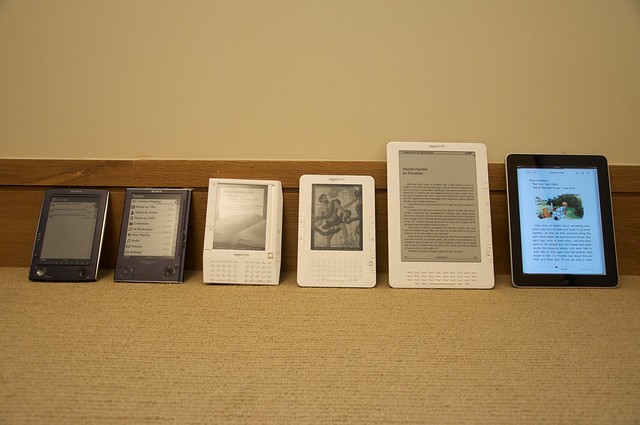 |
| Evolution of Readers by John Blyberg, used under CC license |
Beloved library patrons, if you thought the 24-hour television news media was going to send you catatonic with their fear mongering, you should try being a librarian. The scares are frequent from our professional librarian media, with threats of the end of our profession looming in every corner.
Right now, and for the past several months, ebooks are the assassins whose sights are trained on your most devoted librarians and your local public library collections [1]. Every screen with a keyboard attached is potential replacement for the codex, ye olde ink on paper bound and glued for your reading pleasure. The more portable the screen, the more dangerous the threat.
Why? Pack one paperback book in your carry-on bag, and it's an inch and a half thick. If it's on your device, whether it be iPad, Nook, Kindle, Kobo, it's a half inch or less in thickness. But wait, that's silly. You'll be finished with that way before your plane touches down, and what'll you do after that, talk to your neighbor? You could take two books, but what if one of them's a stinker? Better play it safe. Take five books in your carry-on, and that's either a seven-and-a-half inch thick paperback brick of pulped paper OR that same sleek half-inch thick device that will make you feel more advanced than your fellow passengers, the first primate to consider attacking travel downtime with a mastodon femur.
Okay, we say, ebooks are definitely cool. We librarians want to help you get them, because we do that. It's our thing.
Now we come to the problem. In olden times, we provided you books by purchasing them for our collection and letting you borrow them. Only one person could have a particular book at a time because it was a physical object. I mean this quite literally--you can't have the copy of China Mieville's Kraken that's in my bag right now because it can't be in two places at once.
Ebooks can be in two places at once. You know this and we know this--it's an electronic file you download to your device. It can be on your home computer, your work computer, your iPhone, and your Sony eReader all at once. That's the power of digital text.
Presently, libraries do not have a system that lets them merge the old and new models. When I envision this system, it doesn't look much different than an online library catalog or Amazon--it would be the library catalog, listing both ebooks and books all in one. You'd search for copies of digital materials the library has purchased and owns, and download the ebook you want to read. Idyllic and utopian, isn't it?
In reality, we are restricted by copyright laws from doing this. Publishers likely felt the cost to you to photocopy an entire book was deterrent enough from worrying about book pirating. Ebook pirating is cheap--you get ebook file, you share ebook file with friend. As a side note, this is not good behavior. Shame.
The effects of this mean that libraries are technically not allowed by law to lend Kindles to patrons. Libraries cannot lend Kindle digital content to you to read on your Kindle. At least, conservative readings of the fine print caution against doing so [2].
These effects lead to complicated systems that prevent libraries from owning ebooks like we've always owned print books. To provide ebooks to you now, we subscribe to services that manage ebooks like Overdrive, the muscle behind My Media Mall, from which you can download audiobooks and ebooks. In order to use My Media Mall, you have to download the Overdrive Media Console, which is necessary because of anti-theft software built into the program and the ebook/audiobook files. There is no trace of the simplicity of my idyllic model--a separate system holds e-copies of books that the library does not own in the sense that we could move them to a new system, like moving a book from one shelf to another, and additional software is required for you to use this collection.
Additional rain on my parade is the way these systems treat digital materials like they are finite print materials. Remember that power of digital text--in many places at the same time? In My Media Mall, you'll notice that there limited "copies" of titles. Only "X" number of downloads of a title are permitted in a given time period. It's all the scarcity of the finite, physical world applied to the approaching infinite digital one.
And this is why librarians are painting their sandwich boards, standing on street corners, and if not proclaiming, then inquiring whether the end of our profession and institution is near. We want to provide the downloadable versions of the goods we've always provided, books, movies, and music.
The private sector got there first, iTunes, Netflix, and Kindle. While we coexisted with mall bookshops, downtown record stores, and neighborhood video rental shops, providing the same goods supported by taxes that they did for the cost of membership or fees per use, we do not have any parallels to the new, digital children of those old businesses.
Somehow, I remain optimistic that systems and law will be developed that will allow us to own the rights to lend the electronic materials to you that you increasingly want to borrow. I hope you'll be patient and continue supporting your library, and in the meantime allow us to help you with the systems we have.
Links:
1. The Librarian-in-Black's post on a Future of Libraries presentation about the consumer and library ebook markets.
2. And it's not just the Kindle, according to the No Shelf Required post on Sony's reader library program. It extends beyond ebooks to Netflix, going by librarian.net's post on the topic.
blpost
No comments:
Post a Comment